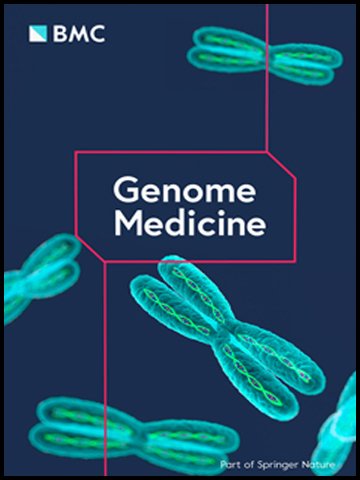Metabolic and inflammatory perturbation of diabetes associated gut dysbiosis in people living with and without HIV infection
IF 10.4
1区 生物学
Q1 GENETICS & HEREDITY
引用次数: 0
Abstract
Gut dysbiosis has been linked with both HIV infection and diabetes, but its interplay with metabolic and inflammatory responses in diabetes, particularly in the context of HIV infection, remains unclear. We first conducted a cross-sectional association analysis to characterize the gut microbial, circulating metabolite, and immune/inflammatory protein features associated with diabetes in up to 493 women (~ 146 with prevalent diabetes with 69.9% HIV +) of the Women’s Interagency HIV Study. Prospective analyses were then conducted to determine associations of identified metabolites with incident diabetes over 12 years of follow-up in 694 participants (391 women from WIHS and 303 men from the Multicenter AIDS Cohort Study; 166 incident cases were recorded) with and without HIV infection. Mediation analyses were conducted to explore whether gut bacteria–diabetes associations are explained by altered metabolites and proteins. Seven gut bacterial genera were identified to be associated with diabetes (FDR-q < 0.1), with positive associations for Shigella, Escherichia, Megasphaera, and Lactobacillus, and inverse associations for Adlercreutzia, Ruminococcus, and Intestinibacter. Importantly, the associations of most species, especially Adlercreutzia and Ruminococcus, were largely independent of antidiabetic medications use. Meanwhile, 18 proteins and 76 metabolites, including 3 microbially derived metabolites (trimethylamine N-oxide, phenylacetylglutamine (PAGln), imidazolepropionic acid (IMP)), 50 lipids (e.g., diradylglycerols (DGs) and triradylglycerols (TGs)) and 23 non-lipid metabolites, were associated with diabetes (FDR-q < 0.1), with the majority showing positive associations and more than half of them (59/76) associated with incident diabetes. In mediation analyses, several proteins, especially interleukin-18 receptor 1 and osteoprotegerin, IMP and PAGln partially mediate the observed bacterial genera–diabetes associations, particularly for those of Adlercreutzia and Escherichia. Many diabetes-associated metabolites and proteins were altered in HIV, but no effect modification on their associations with diabetes was observed by HIV. Among individuals with and without HIV, multiple gut bacterial genera, blood metabolites, and proinflammatory proteins were associated with diabetes. The observed mediated effects by metabolites and proteins in genera–diabetes associations highlighted the potential involvement of inflammatory and metabolic perturbations in the link between gut dysbiosis and diabetes in the context of HIV infection.糖尿病相关肠道菌群失调对艾滋病毒感染者和非艾滋病毒感染者的代谢和炎症干扰
肠道菌群失调与艾滋病病毒感染和糖尿病都有关联,但它与糖尿病代谢和炎症反应的相互作用,尤其是在艾滋病病毒感染的情况下,仍不清楚。我们首先进行了一项横断面关联分析,以描述妇女机构间艾滋病研究中多达 493 名女性(约 146 名患有流行性糖尿病,69.9% 为 HIV +)的肠道微生物、循环代谢物和免疫/炎症蛋白与糖尿病相关的特征。然后对 694 名感染和未感染 HIV 的参与者(391 名女性来自妇女艾滋病机构间研究,303 名男性来自多中心艾滋病队列研究;记录了 166 例发病病例)进行了前瞻性分析,以确定在 12 年的随访中已确定的代谢物与糖尿病发病的关联。研究人员进行了中介分析,以探讨肠道细菌与糖尿病之间的关联是否可以通过代谢物和蛋白质的改变来解释。结果发现,7 个肠道细菌属与糖尿病有关(FDR-q < 0.1),其中志贺氏菌、埃希氏菌、Megasphaera 和乳酸杆菌呈正相关,Adlercreutzia、Ruminococcus 和肠杆菌呈反相关。重要的是,大多数菌种,尤其是阿德勒克鲁兹菌和反刍球菌的关联在很大程度上与使用抗糖尿病药物无关。与此同时,18 种蛋白质和 76 种代谢物,包括 3 种微生物衍生代谢物(三甲胺 N-氧化物、苯乙酰基谷氨酰胺(PAGln)、咪唑丙酸(IMP))、50 种脂类(例如二甘油(DGs)和三甘油(TGs))以及 23 种非脂质代谢物与糖尿病有关(FDR-q < 0.1),其中大多数代谢物与糖尿病呈正相关,一半以上的代谢物(59/76)与糖尿病发病有关。在中介分析中,一些蛋白质,尤其是白细胞介素-18受体1和骨保护蛋白、IMP和PAGln部分中介了观察到的细菌属与糖尿病的关联,尤其是阿德勒克鲁兹菌和埃希氏菌。艾滋病毒改变了许多与糖尿病相关的代谢物和蛋白质,但没有观察到艾滋病毒改变了这些代谢物和蛋白质与糖尿病的关系。在感染和未感染艾滋病毒的个体中,多种肠道细菌属、血液代谢物和促炎蛋白与糖尿病有关。所观察到的代谢物和蛋白质在菌属与糖尿病关系中的介导效应突出表明,在感染艾滋病毒的情况下,炎症和代谢紊乱可能参与了肠道菌群失调与糖尿病之间的联系。
本文章由计算机程序翻译,如有差异,请以英文原文为准。
求助全文
约1分钟内获得全文
求助全文
来源期刊

Genome Medicine
GENETICS & HEREDITY-
CiteScore
20.80
自引率
0.80%
发文量
128
审稿时长
6-12 weeks
期刊介绍:
Genome Medicine is an open access journal that publishes outstanding research applying genetics, genomics, and multi-omics to understand, diagnose, and treat disease. Bridging basic science and clinical research, it covers areas such as cancer genomics, immuno-oncology, immunogenomics, infectious disease, microbiome, neurogenomics, systems medicine, clinical genomics, gene therapies, precision medicine, and clinical trials. The journal publishes original research, methods, software, and reviews to serve authors and promote broad interest and importance in the field.
 求助内容:
求助内容: 应助结果提醒方式:
应助结果提醒方式:


